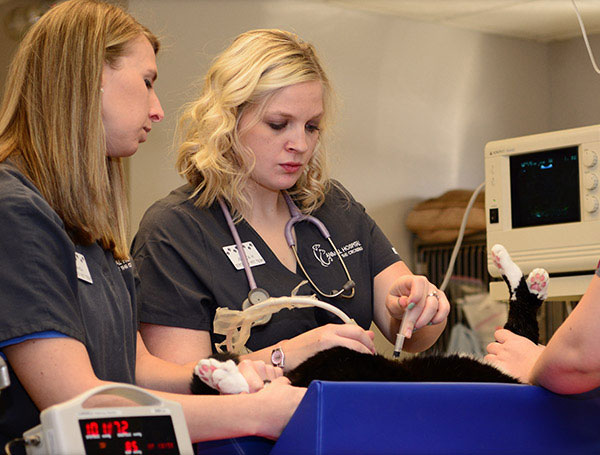Internal Medicine
Just like people, as pets age they may develop more serious medical conditions that require in-depth or specialized veterinary care. Our highly trained veterinarians are able to diagnose and treat most of the more complex disorders your pet may develop during his or her lifetime.
We work very closely with our clients every step of the way to reach a diagnosis and formulate a treatment plan for your pet that works for you and your family. We pride ourselves on our rigorous training and commitment to ongoing education, which gives our Veterinarians and Veterinary Technicians continued access to the most up-to-date treatment protocols so that your pet can be assured the finest care possible.
If you notice your pet with any of the symptoms listed below, please bring your pet in for an exam as soon as you can. We will thoroughly examine your pet and gather information about your pet’s condition. Additional diagnostic procedures may be required to find the cause of your pet’s problems before we develop a treatment protocol.
Cardiology
If your pet should develop a disorder of the canine or feline cardiovascular system, including the heart and blood vessels, our Veterinarians can diagnose and treat your pet. Just like humans, dogs and cats can suffer from a variety of disorders related to their heart and lungs, including congestive heart failure, hypertension, cardiomyopathy and valvular disorders.
Symptoms of canine or feline heart problems include:
- Weakness or collapse
- Fainting spells
- Coughing
- Exercise intolerance
- Shortness of breath or apparent difficulty in breathing
- Fast breathing at rest (different than normal panting)
Endocrinology
At Animal Hospital at the Crossing, we treat animals with glandular and metabolic problems. Endocrinology is the branch of medicine dealing with hormonal imbalances in your pet’s body. Hormonal diseases can occur as a result of an excess of certain hormones, such as hyperthyroidism in cats, or lack of hormones, such as diabetes. There are several endocrines and renal diseases you may have heard of:
- Diabetes
- Canine Cushing’s disease
- Feline hyperthyroidism
- Acute or chronic kidney failure
- Addison's disease
- Canine Hyperthyroidism
Hormonal diseases can cause a multitude of clinical signs in your pet, depending on what organ is affected and whether the problem is an excess or a lack of a particular hormone. Some of the symptoms of hormonal imbalance are:
- Vomiting, increased/decreased appetite
- Skin problems, such as hair loss or recurrent infections
- Increased drinking and urinating
- Weight loss or weight gain
- Weakness and lethargy
- Excessive panting
Gastroenterology
Our Veterinarians treat a wide variety of animal gastrointestinal diseases and conditions of the digestive tract. This organ system includes the stomach, small intestine, colon, liver, pancreas, and gall bladder. Examples of gastrointestinal disorders in your pet are:
- Bloat
- Swallowed/chewed items
- Pancreatitis
- Inflammatory Bowel Disease
Symptoms of Pets with gastrointestinal disorders include:
- Vomiting
- Weight loss
- Loss of appetite
- Diarrhea
- Poor body condition
Urology
Our Veterinarians are able to diagnose and treat disorders of the urinary tract and reproductive systems. Urological disorders can include acute or chronic kidney failure, kidney or bladder stones, blockage of the urinary tract or urinary incontinence. Symptoms of pets with urological disorders include:
- Excessive drinking and/or urinating
- Blood in the urine
- Excessive frequency of urination
- Urinary incontinence
If you notice your pet with any of these symptoms, please bring your pet in for an exam. We will thoroughly examine your pet and gather information about your pet’s condition. Diagnostic procedures may be required to find the cause of your pet’s problems.
Diagnostic Tools
At Animal Hospital at the Crossing, we use the latest technology to diagnose your pet, including:
- Digital radiography
- Electrocardiography
- Ultrasonography
- Advanced laboratory diagnostic testing
- Oncology testing
If your pet suffers from a serious disease requiring specialized care, we are trained in advanced medical procedures and techniques, including biopsies, critical care management, intravenous fluid therapy, chemotherapy, and diabetic stabilization.
Call us at (217) 356-6387 if you have questions, or need to schedule your pet's next appointment.

